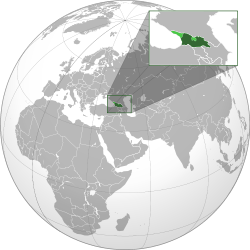Georgia: Could The Georgian Dream Turn Into A Nightmare? – Analysis
By Eurasianet
By Molly Corso
This article was updated at 2:20am EST on October 4.
After a solid victory over President Mikheil Saakshvili’s United National Movement in Georgia’s October 1 parliamentary elections, billionaire Bidzina Ivanishvili and his nine-party coalition may feel like they are living the Georgian Dream. But keeping the coalition together and governing effectively may prove a challenge.
With 99.5 percent of the votes counted, the Georgian Dream has 54.92 percent of the proportional vote, compared with 40.35 percent for the UNM. The coalition also has a narrow lead among the 73 first-past-the-post races as well – 39 seats compared with 34 for the UNM.

While the results have not been finalized yet, it’s clear that the process of forming the next government will not be straightforward. Under the constitution, President Saakashvili can take the lead in forming a cabinet, but his selections must be confirmed by parliament. However, Saakashvili has already indicated he will stand out of the Georgian Dream’s way. In a bid to avoid “a political crisis,” UNM spokesperson Chiora Taktakishvili said, the president will allow the Georgian Dream to take the initiative in cobbling together a cabinet for parliamentary approval.
The coalition has already formed a three-person group – comprising Irakli Alasania of Our Georgia-Free Democracy, Davit Usupashvili of the Republican Party and Irakli Gharabashvili of the Georgian Dream Party – to lead discussions on a proposed new cabinet.
But while, at first glance, the coalition might seem firmly on the road to governing, some observers believe the process of forming a cabinet could turn into a make-or-break moment for the Georgian Dream. Saakashvili, then, may be aiming to give the Georgian Dream coalition the rope with which it could hang itself.
The nine parties that make up the coalition span the political spectrum – ranging from hard-core nationalists to liberal progressives. It is a motley mix that features ex-Saakashvili allies like Tedo Japaridze, his first foreign minister, and Irakli Alasania, Georgia’s former United Nations envoy, as well as complete political ingénues like former Milan soccer star Kakhi Kaladze.
Ivanishvili’s Georgian Dream party is the strongest in the coalition with 96 names registered. The remaining parties range from 20 representatives to just one.
The internal process of haggling over which party receives what ministerial post could be a “stimulus” toward the coalition’s collapse, commented political scientist Malkhaz Matsaberidze.
“These people are different in political views, some cardinally different,” Matsaberidze said. “Among them they don’t just have difference in ideas; some of them do not even like each other.”
Ivanishvili, who was not a candidate in the elections, earlier had predicted that the coalition would dissolve post-election. Since the vote, he has not commented further on that prospect.
Lacking the 100 seats needed for a constitutional majority, or the 90 seats needed to veto presidential initiatives, the Georgian Dream will need internal cohesion if it is to have any hope of pushing ahead with its legislative agenda. And for some of its more ambitious aims, such as impeaching Saakashvili, changing the constitution or moving the parliament back to Tbilisi from the central city of Kutaisi, the coalition will need to attract the support of at least some UNM MPs.
“The first step of the party will be an effort to form a constitutional majority,” predicted Matsaberidze. “I believe they will try to bring over majoritarian candidates from the United National Movement.”
Given the disparate political views among coalition members, it may be easy for a unified UNM bloc to exploit openings during parliamentary debates, and score political points. Few among the Georgian Dream coalition have served before in parliament, thus they are inexperienced in the arts of legislative procedure and in making political alliances.
The parliamentary campaign marked Ivanishvili’s own political debut, and, in the days since the election, he has made some significant missteps. For example, Ivanishvili’s October 2 call for Saakashvili’s resignation and indications that the coalition was considering criminal prosecution against unnamed senior UNM members can only alienate UNM members, and thus make the task of implementing the Georgian Dream’s legislative agenda more difficult.
Amid an international outcry, Ivanishvili later backed away from such calls for Saakashvili’s resignation and UNM prosecutions.
Meanwhile, a fierce struggle over votes, and thus a potential extra seat or two in parliament, continues to rage in several areas of Georgia. From small villages like Terjola in central Georgia to strategic regional seats like Zugdidi in western Georgia, party activists from both sides are struggling fiercely over districts’ final tabulations in a bid to hold onto votes or secure a few more.
Central Election Commission Chair Zurab Kharatishvili, along with European observers, on October 3 strongly denounced the alleged use of physical intimidation by party activists to force election commissions in several locations to alter vote tabulations.
UNM spokesperson Taktakishvili, who was elected to parliament, accused the Georgian Dream of using “intimidation” to usurp the UNM’s victories, even at the precinct level.
“They are undermining the democratic process which means if you win the elections you should definitely be happy, but if you are losing in some districts … you should recognize this defeat,” she said.
The Georgian Dream did not respond to repeated requests for comment.
Molly Corso is a freelance journalist who also works as editor of Investor.ge, a monthly publication by the American Chamber of Commerce in Georgia.
